EXCLUSIVE: Police Blitz on Illegal E-Bike Use Amid Safety Concerns
Crack Down Sparks Fresh Calls for Stricter Regulation
Exclusive Report By Gary Fanning
Police in Glasgow have seized dozens of e-bikes in a crackdown on illegal and dangerous riding, amid mounting calls for tougher regulations following a series of alarming incidents.
👉 This story is built on weeks of reporting — attending many community meetings across the city, speaking to residents, and following the police crackdown as part of our ongoing coverage of safety concerns in Glasgow.
If you believe in investigative reporting that puts the community first, consider supporting this work by becoming a paid subscriber. Your subscription helps ensure we can continue to cover these critical stories and hold authorities accountable. Unlock the full investigation now and stay informed about the future of Glasgow’s streets.
Officers carried out a Day of Action in December targeting electric bikes in the city centre, resulting in 24-e bikes being seized and 102 offences reported to the Procurator Fiscal.
Police announced their crackdown at last week’s Merchant City and Trongate Community Council meeting, warning further operations will take place without notice.
Some residents have described city-centre pavements as "racetracks", with riders zooming along pedestrian precincts at breakneck speeds.
One community councillor said: “There are bikes zooming along Argyle Street at 40mph outside Marks & Spencer on a pedestrian precinct. It is frightening.”
A Merchant City resident, who said she had been hit by e-bikes in the past, added: “It is not that safe when walking.”
City centre councillor Angus Millar explained that special regulations allow cyclists to legally use precincts on Sauchiehall Street and Buchanan Street, but insisted that police are tackling breaches of the Highway Code.
He added that the Avenues project will introduce separate cycle lanes on Argyle Street and West Nile Street, which will segregate cyclists and pedestrians.
Safety Concerns
The rise of e-bikes has sparked safety fears across the city, with reports of near misses and reckless riding — particularly on pavements and pedestrian areas.
In one recent incident, an 18-year-old man was left in critical condition following an e-scooter crash in Castlemilk.
Last year, an 89-year-old woman was struck by an e-bike at the junction of Renfield Street and Sauchiehall Street, setting back her recovery from hip surgery..
Another woman carrying her child narrowly avoided being hit by a Deliveroo rider near Charing Cross, while a man was struck by an e-bike outside The Gushet in Shawlands.
Police stopped one e-bike delivery rider last year for cycling on the M8 motorway near Townhead — dangerously close to oncoming traffic.
Hillhead residents have also raised concerns about delivery riders speeding along Byres Road, describing the situation as “an accident waiting to happen.”
In an email to The Splash, a resident reported similar problems in Kelvingrove and Yorkhill.
She highlighted that many delivery riders wear dark clothing and fail to equip their bikes with lights, creating a significant hazard as daylight hours shorten in the winter.
“The issue has been raised with delivery companies, but they seem unwilling to take meaningful action,” she wrote.
“This highlights the urgent need for legislation, especially around insurance.”
She questioned whether delivery riders, if self-employed, have public liability insurance for accidents, adding: “And if they’re employees, are delivery companies providing sufficient coverage?”
Police Scotland ramped up patrols at the Govan to Partick footbridge in response to growing complaints about e-bikes and vandalism near the Riverside Museum.
Fire Hazards Spark Legislative Debate
Beyond safety concerns, e-bike battery fires have prompted debates in the House of Lords. As part of the Product Regulation and Metrology Bill, lawmakers are addressing the risks of lithium-ion batteries, which have caused a 46 per cent increase in fires between 2022 and 2023.
Baroness Finlay of Llandaff highlighted a tragic incident in Cambridge where a battery explosion claimed the lives of a mother, Gemma, and her two children in June 2023. Her partner remained in a coma for a month.
The debate has also drawn attention to online marketplaces that sell potentially dangerous e-bike conversion kits.
His son Craig and brother Allan Gow, an SNP councillor, are campaigning for stricter regulations on off-road vehicles, including mandatory registration to improve policing and safety. They’re urging Glasgow City Council to work with both the Scottish and UK governments to address the issue.
David Gow, 79, pictured above, died in February 2024 after being hit by an off-road motorbike in Glasgow’s Balmore Road
His son Craig and brother Allan Gow, an SNP councillor, are campaigning for stricter regulations on off-road vehicles, including mandatory registration to improve policing and safety.
They’re urging Glasgow City Council to work with both the Scottish and UK governments to address the issue.
Allan’s motion also includes e-bikes and e-scooters, which can be dangerously modified. Despite previous efforts for legal changes stalling, discussions continue with local MPs and the Scottish Government. The goal is to reduce the harm caused by dangerous vehicle misuse in both urban and rural areas.
Police: "Our Hands Are Tied"
Police acknowledge the severity of the issue but admit they are struggling to keep up.
“We know it’s a real problem,” a police spokesperson said. “We stop these riders and charge them with multiple offences — sometimes up to seven at a time. We seize their bikes, but within the hour, they’re back on another one, supplied by their delivery company.”
Many delivery companies lease e-bikes to riders, making it easier for offenders to quickly obtain replacement bikes with little oversight.
On busy days, officers have confiscated as many as 14 e-bikes, only to see the same riders back on the streets within half an hour.
“I wish I had a magic wand,” one officer said. “But with an endless supply of bikes, there’s only so much we can do.”
Calls for Licensing
The growing backlash has led to calls for mandatory licensing and registration plates for e-bike riders.
And Garnethill Neighbourhood Watch recently met with Labour MSP Pauline McNeil to address the issue.
William Beckett, chairman of the group, highlighted the dangers of unregulated e-bikes.
He said: “Some of these modified bikes can reach speeds of 30mph.
“The batteries, especially the cheaper ones, are prone to malfunction and can even explode. It’s a major safety concern.”
Glasgow Labour MSP Pauline McNeill said: “My constituents in Garnethill have been raising this for a while due to accidents and near misses, especially at crossings near Sauchiehall Street.
“I believe there has to be a recognition that e-bikes need some regulation for public safety.”
Under current UK laws, e-bikes with a maximum motor output of 250 watts and a top speed of 15.5mph are treated like conventional bicycles and do not require insurance or registration.
However, illegally modified bikes or those exceeding these limits are classed as motor vehicles and must be licensed and insured.
A Scottish Government spokeswoman said: “Regulations on e-vehicles are reserved, so this would be for the UK Government.”
A UK Government spokesperson added: “There are strict laws in place for e-cycles, including a 15.5 miles-per-hour speed limit for electrical assistance. Anybody found breaking these rules will be prosecuted by the police.”
Further Action
Police Scotland confirmed they will carry out more unannounced Days of Action to clamp down on illegal e-bike use.
A force spokesperson said: “E-bike riders are subject to the same laws as other road users. Where bikes are uninsured, unlicensed or illegally modified, officers will take action.”
Community councils across Glasgow are continuing to press for tighter legislation, with ongoing discussions involving MPs, MSPs and local policing teams.
Commentary and Analysis: The Escalating E-Bike Problem in Glasgow
The issue of e-bike misuse across Glasgow has reached a critical point, with growing public frustration and mounting pressure on authorities to take decisive action. Recent police crackdowns have highlighted the scale of the problem, yet the city’s streets continue to witness reckless riding, dangerous modifications, and widespread disregard for safety regulations.
A Persistent Problem
Despite efforts by Police Scotland, including December's Day of Action where 24 e-bikes were seized and 102 offences reported, the problem remains widespread. Community testimonies paint a vivid picture of a city where pavements have become “racetracks”, with delivery riders weaving through pedestrian areas at alarming speeds. From the heart of Merchant City to Byres Road and beyond, residents report near misses, collisions, and a constant sense of unease.
The frustration is palpable. “It’s frightening,” one community councillor said, describing bikes hurtling through Argyle Street at speeds up to 40mph. The situation has only worsened with the growing demand for delivery services, where pressure to meet tight deadlines often trumps safety considerations.
A Perfect Storm: Demand, Loopholes and Accountability Gaps
At the heart of the issue lies the gig economy's reliance on e-bike delivery riders, combined with weak regulations that have failed to keep pace with technological advances.
Many delivery riders operate as self-employed contractors, leasing bikes directly from companies or third-party providers. This system creates limited accountability, making it easier for rogue riders to slip through the cracks.
As police have admitted, they can seize bikes during enforcement actions, but within hours, the same riders are often back on the streets with replacement bikes provided by their companies.
The lack of licensing, registration, or mandatory insurance only compounds the problem. While the UK Government insists existing legislation is sufficient, the reality on the ground tells a different story. With bikes capable of reaching 30-40mph — often through illegal modifications — these vehicles have effectively become unregulated motorbikes operating with impunity.
The Role of Consumer Demand
We must also acknowledge that we, as consumers, bear some responsibility in this growing crisis. The surge in takeaway deliveries across the city — from small independent restaurants to major chains like McDonald's, Greggs, and Subway — has fuelled the demand for ever-faster deliveries. Supermarkets and delivery giants are increasingly entering the market, offering home deliveries from the West End to the city centre and beyond.
This race to provide quicker and more convenient services has placed delivery riders under immense pressure to meet tight schedules. The faster they deliver, the more orders they can complete — a dynamic that encourages risky behaviour on the roads. Without consumer awareness and pressure on delivery companies to prioritise safety over speed, the problem is unlikely to improve.
Public Safety at Risk
The consequences are no longer theoretical — they are playing out on the city’s streets.
An 89-year-old woman was hit by an e-bike at Renfield Street, setting back her recovery from hip surgery.
A mother narrowly avoided being struck while carrying her child near Charing Cross.
A man was caught riding an e-bike on the M8 motorway, posing a severe danger to himself and others.
Hillhead residents warn of “an accident waiting to happen” as delivery riders speed along Byres Road.
The sense of vulnerability is particularly acute for elderly residents, parents with prams, and visually impaired pedestrians, whose safety is increasingly at risk.
Fire Hazards and Battery Safety
Beyond road safety, the rise of e-bike battery fires poses a hidden but equally alarming danger.
The tragic death of David Gow, killed by an off-road bike in Balmore Road, underscores the lethal consequences of unregulated vehicles.
The UK Government’s ongoing review of lithium-ion battery regulations is a step forward, but the market remains flooded with dangerous conversion kits and cheaply made batteries that heighten fire risks. Campaigns by Craig and Allan Gow for mandatory registration of off-road vehicles, e-bikes, and e-scooters deserve urgent consideration.
What Can Be Done?
It is clear that piecemeal enforcement alone will not solve the problem. A comprehensive strategy is urgently needed — one that balances the benefits of e-bikes with the need to protect public safety.
1. Mandatory Registration and Licensing:
E-bikes capable of speeds above 15.5mph should require registration plates and insurance, akin to mopeds.
Delivery riders should carry public liability insurance as a minimum requirement.
2. Corporate Accountability:
Delivery companies must be held responsible for ensuring their riders are properly trained, insured, and equipped with lights and reflective gear.
Leasing schemes must include strict background checks and vehicle safety requirements.
3. Stricter Enforcement and Legislation:
Police Scotland requires additional resources to carry out regular, unannounced enforcement operations.
Westminster must close loopholes allowing easy access to illegal conversion kits.
Scottish Government and local councils should lobby for a nationwide licensing system for high-powered e-bikes.
4. Public Awareness Campaigns:
Launch targeted campaigns to educate riders on safe e-bike use, legal requirements, and battery safety.
Work with schools and community groups to promote responsible cycling habits.
5. Infrastructure Investment:
The completion of Glasgow’s Avenues project — with segregated cycle lanes — must be accelerated to reduce conflicts between cyclists and pedestrians.
A Cross-Government Approach
One of the greatest frustrations for residents is the political buck-passing between Holyrood and Westminster. The Scottish Government insists that e-bike regulations are a reserved matter, while the UK Government claims that existing laws are adequate.
This stalemate is no longer tenable. Both governments must work together to deliver a unified regulatory framework that protects pedestrians, riders, and the wider public.
Conclusion: Time for Action
Glasgow is at a tipping point. The growing prevalence of e-bikes presents both an opportunity and a challenge for the future of urban transport. Without decisive action, the risks will continue to outweigh the benefits.
Residents have every right to demand safer streets. The stories of those injured — and the voices of those who fear it will only be a matter of time before another tragedy occurs — should be a rallying cry for urgent reform.
The solution lies not in banning e-bikes, but in creating a system where convenience does not come at the cost of public safety.
Policymakers, police, and delivery companies must come together to forge a balanced, forward-looking approach that makes Glasgow’s streets safer for everyone.
If you value independent, community-driven journalism, please consider supporting The Splash by becoming a paid member. Your subscription helps keep stories like this one alive—funded by readers, not corporations, shareholders, investors or advertisers. Join us today and help keep Glasgow’s voice strong! Thank you

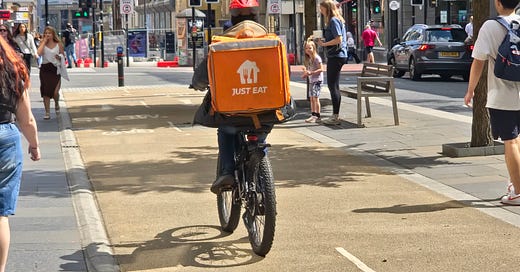



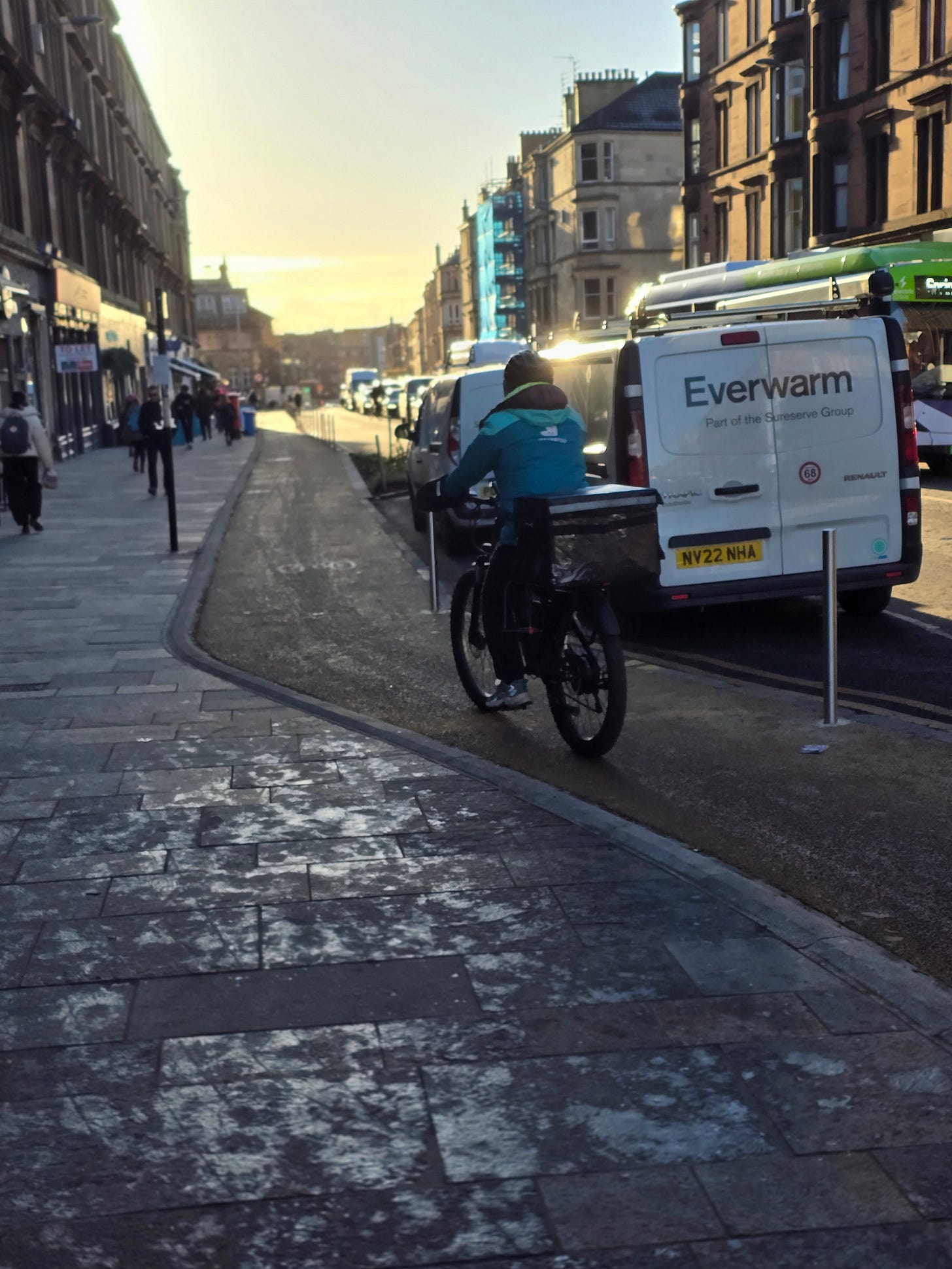
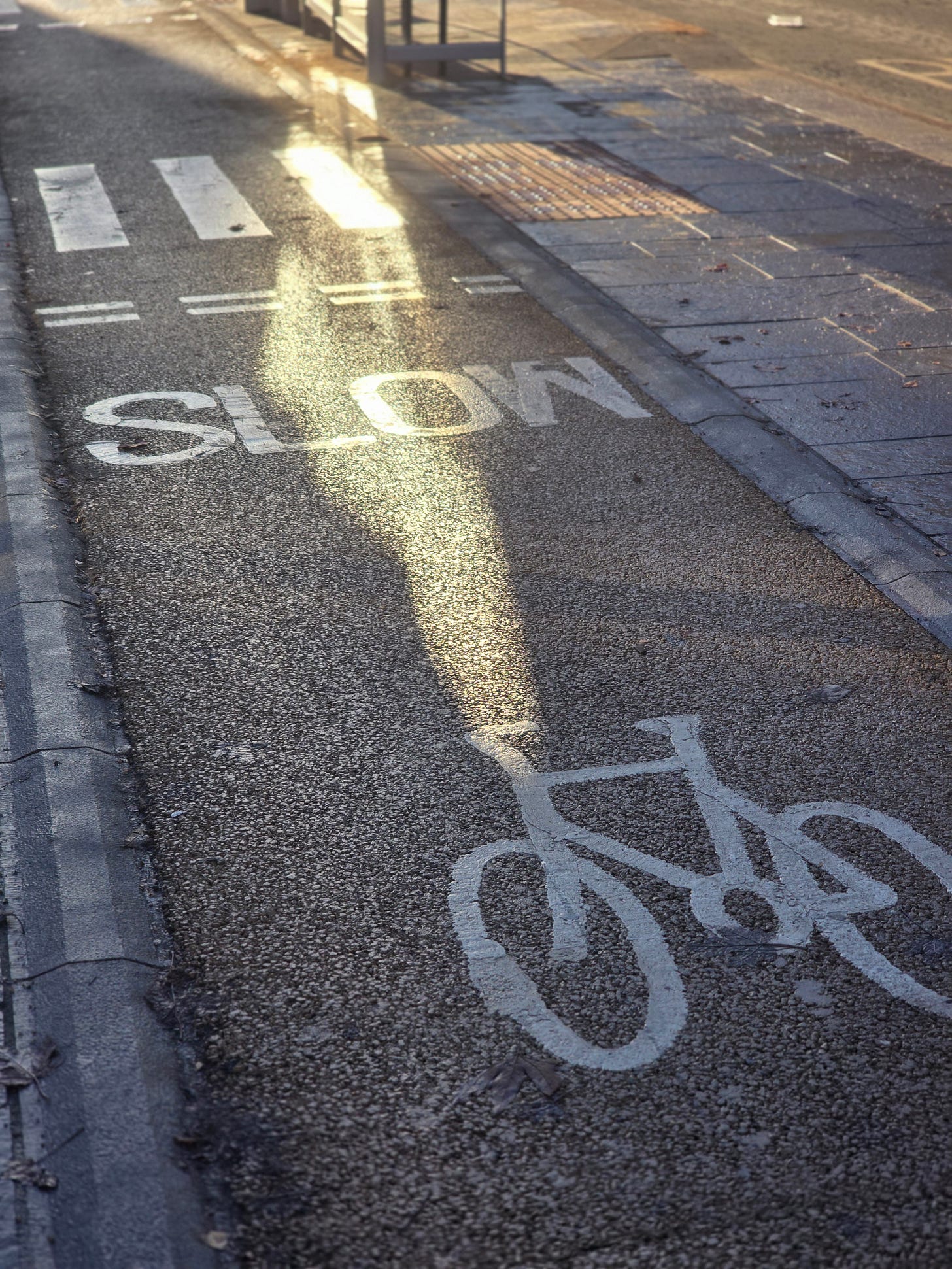
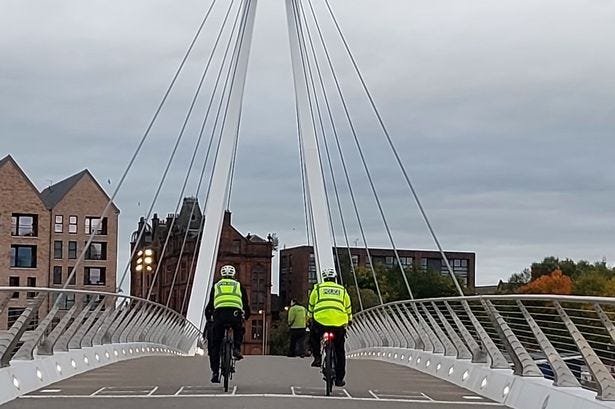
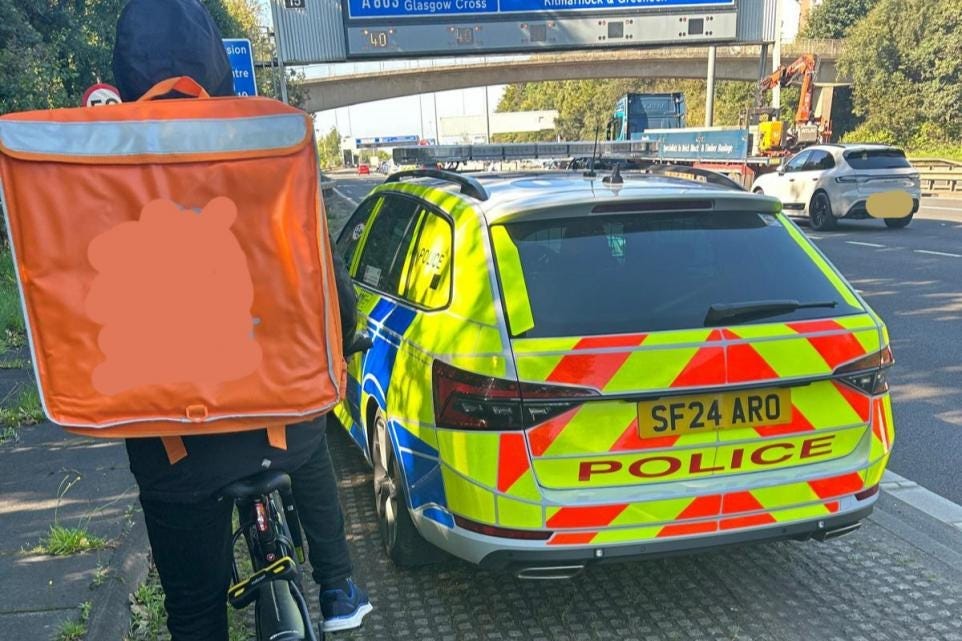

Excellent and I have just written to Martin Rhodes MP forwarding this article and asking for support.
Indeed we should all be writing to MPs and MSPs
Thank you for this. Hopefully the mainstream media will pick up on it and get it out there as it is not just an issue in Glasgow but across the UK. The Labour Goverment must do something now, they have the evidence, they simply must provide the legislation to make sure citizens are safe but also that those who rely on e-bikes to do their jobs are both safe and accountable. Companies who employ these workers need to be held responsible. A fund for those who are hurt or where family members are killed would be a start.